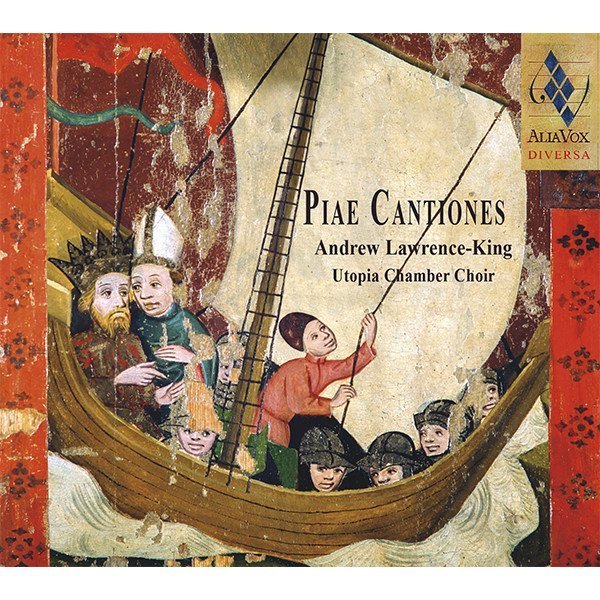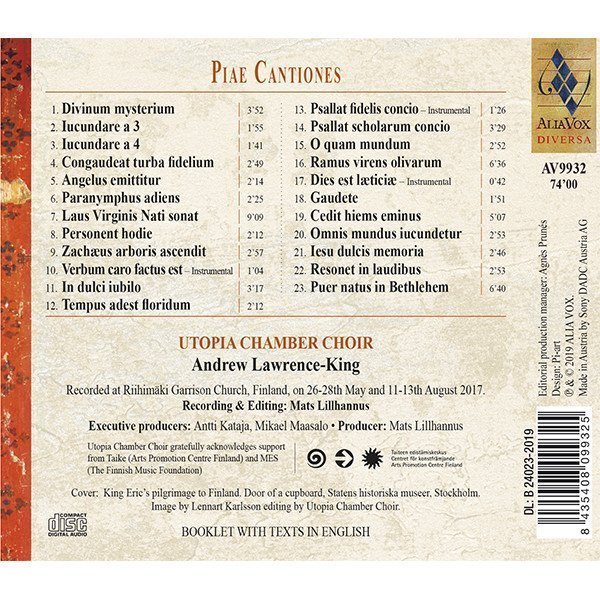PIAE CANTIONES
Utopia Chamber Choir
15,99€
Agotado
ALIA VOX DIVERSA
ALIA VOX DIVERSA, the new collection created 4 years ago to host independent productions by outstanding musicians who for many years have featured in concerts and recordings with our ensembles HESPÈRION XXI, LA CAPELLA REIAL DE CATALUNYA and LE CONCERT DES NATIONS, is pleased to release and present this new album Piae Cantiones (Spiritual Songs) by the vocal ensemble UTOPIA CHAMBER CHOIR and an instrumental group conducted by Andrew Lawrence-King. This new programme, conceived, recreated and directed by Andrew Lawrence-King one of the most long-standing and imaginative collaborators in our long career in musical production, brings us the beautiful and ancient spiritual songs celebrating the mystery of the Nativity. The earlier choral versions, which were released in Finland, have enjoyed great success in Nordic and English-speaking countries.
Once again, this extraordinary programme embodies all the qualities envisaged for the Alia Vox Diversa collection: the rediscovery of neglected repertories such as the spiritual music surrounding the celebration of the Nativity from the ancient cultures of Finland and other Nordic lands, recreated and performed with sensitivity and assurance, as well as respect for the traditions and historical practices of the Renaissance and the early Baroque.
Let us listen to this wonderful music, these hauntingly beautiful songs and, thanks to the talent and sensitivity of the singers and instrumentalists of UTOPIA CHAMBER CHOIR under the direction of Andrew Lawrence-King, discover in the vitality and emotion of these musical gems the essence of the spiritual musical culture of the old northern European countries.
JORDI SAVALL
Bellaterra, 1st October, 2019
CatalunyaMúsica:
Piae Cantiones’ Origins
500 years before 1582
Piae Cantiones (Spiritual Songs), the first Finnish music ever to be printed, was published in Greifswald in 1582 under the direction of Theodoricus Petri Rutha, a Finnish student matriculated at nearby Rostock University. The songs and texts were edited by Jaakko Suomalainen, also known as Finno, Headmaster of the Cathedral School at Turku, who also published the first Finnish hymnal. But although many of the texts are on religious themes, the Piae Cantiones songs are not hymns; they represent a varied repertoire sung as extra-curricular entertainment for the Turku students. Styles range from the lively dance-rhythms and catchy refrains of Gaudete, to the cool renaissance counterpoint of Jesu dulcis memoria to the austere restraint of chant-like melody in Angelus emittitur, the first song in the book.
A second edition, published in 1625 by two scholars from Viipuri, former Rostock University students, was edited by Daniel Friderici, cantor at the church of St Mary’s, Rostock. A celebratory facsimile of the 1582 print was published in Helsinki in 1967. The songs heard on this recording were transcribed from the original 16th-century notation by Mats Lillhannus, with additional work by Valter Maasalo and Andrew Lawrence-King. Many modern editions transpose the songs freely, for the convenience of church choirs, but we have chosen to perform each song according to the original clefs. Some songs are notated for high voices in treble or soprano clefs; others are written in tenor or baritone clef. Psallat scholarum concio in hoc convivio begins in bass clef, on what is in theory the lowest note of the medieval hexachord system, low G or Gamut, from where it descends! We can perhaps imagine a gang of older students singing and playing instruments (psallere means to sing psalms, or to play a psalm-inspired instrument, such as a psaltery, or King David’s harp) at a Christmas party (convivio).
+ Información en el booklet del CD
ANDREW LAWRENCE-KING








Compartir